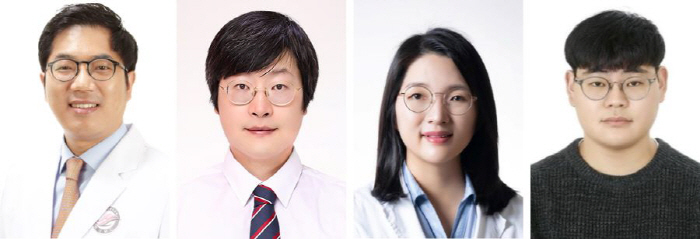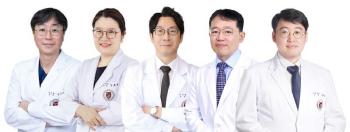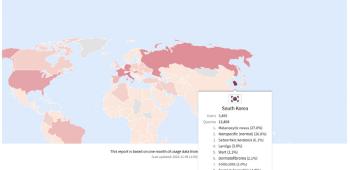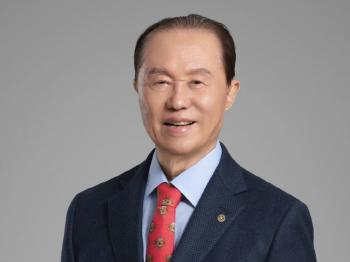Professor Lee Seok-hyun's team at Hallim University's Gangnam Sacred Heart Hospital listed Hanbitsa as a research on bone metastasis AI
Apr 29, 2025
A research team led by Professor Lee Seok-hyun of the Department of Radiology at Hanlim University's Gangnam Sacred Heart Hospital (Professor Kim Dong-woo of the Department of Nuclear Medicine at Hanlim University Sacred Heart Hospital, Professor Son Hye-joo of the Department of Nuclear Medicine at Dankook University Hospital, and Park Se-hyun of the College of Medicine at Hanlim University) in recognition of the results of a comparative study on the diagnostic performance of CNN and Transformer models using.
Bone scanning is a test that shows the bone activation area as an image, and is performed to check for inflammation, damage, or cancer metastasis of the bone. In particular, bone scans are mainly performed for prostate cancer and breast cancer patients with relatively common bone metastases. This is because the patient's burden is low because the bones of the whole body can be checked at once at a lower cost than CT or MRI.
Recently, research on artificial intelligence (AI) models has been actively conducted in various medical images such as X-rays and endoscopes, but there are still few artificial intelligence studies on bone scans. In particular, not many studies have been conducted on whether state-of-the-art artificial intelligence models with significantly improved performance, such as Transformer models and ConvNeXt, are useful in actual medical imaging diagnosis.
The research team compared the diagnostic performance of several artificial intelligence models with a total of 6,175 patients, including 4,694 patients at Hallim University Gangnam Sacred Heart Hospital and 1,481 patients at Hallim University Sacred Heart Hospital. Among AI models, ResNet, the most widely applied in the medical imaging field, Transformer models used in ChatGPT, and ConvNeXt, which improved ResNet, were used in the study. As a result, ResNet was 63% sensitive and 90% specificity when diagnosing bone metastasis in bone scan, while ConvNeXt was able to diagnose bone metastasis more accurately with 79% sensitivity and 100% specificity.
In response, Professor Lee Seok-hyun's research team compared the results of applying several latest artificial intelligence models to bone scanning and suggested the possibility that artificial intelligence models could be useful for diagnosis. In particular, this study further increased the reliability of the attention study in that it cross-verified the performance of artificial intelligence models in bone scanning with external data as well as internal hospital data. In recognition of these achievements, the research team won the 'Young Researcher Award' at the 63rd Fall Conference of the Korean Nuclear Medical Association and was also selected for the BRIC 'Hanbitsa'.
Professor Lee Seok-Hyun believes that the latest AI models, such as ConvNeXt, can be widely used in several medical images, including bone scanning, based on research results"We will continue to conduct various artificial intelligence studies on the application of the latest technologies so that patients can be diagnosed with medical imaging more quickly and accurately in the future."."
Hanbitsa is a system in which the Biological Research Information Center (BRIC) selects and introduces Korean researchers who have published papers in world-renowned life science-related journals and their research results. It targets papers published in journals with an influence index (JIF or 5-Yr JIF) of the Journal Citation Reports (JCR) of 10 or higher or within the top 3% of each field, and has the meaning of recognizing international research achievements by researchers in the life sciences and medical fields.
Bone scanning is a test that shows the bone activation area as an image, and is performed to check for inflammation, damage, or cancer metastasis of the bone. In particular, bone scans are mainly performed for prostate cancer and breast cancer patients with relatively common bone metastases. This is because the patient's burden is low because the bones of the whole body can be checked at once at a lower cost than CT or MRI.
Recently, research on artificial intelligence (AI) models has been actively conducted in various medical images such as X-rays and endoscopes, but there are still few artificial intelligence studies on bone scans. In particular, not many studies have been conducted on whether state-of-the-art artificial intelligence models with significantly improved performance, such as Transformer models and ConvNeXt, are useful in actual medical imaging diagnosis.
The research team compared the diagnostic performance of several artificial intelligence models with a total of 6,175 patients, including 4,694 patients at Hallim University Gangnam Sacred Heart Hospital and 1,481 patients at Hallim University Sacred Heart Hospital. Among AI models, ResNet, the most widely applied in the medical imaging field, Transformer models used in ChatGPT, and ConvNeXt, which improved ResNet, were used in the study. As a result, ResNet was 63% sensitive and 90% specificity when diagnosing bone metastasis in bone scan, while ConvNeXt was able to diagnose bone metastasis more accurately with 79% sensitivity and 100% specificity.
In response, Professor Lee Seok-hyun's research team compared the results of applying several latest artificial intelligence models to bone scanning and suggested the possibility that artificial intelligence models could be useful for diagnosis. In particular, this study further increased the reliability of the attention study in that it cross-verified the performance of artificial intelligence models in bone scanning with external data as well as internal hospital data. In recognition of these achievements, the research team won the 'Young Researcher Award' at the 63rd Fall Conference of the Korean Nuclear Medical Association and was also selected for the BRIC 'Hanbitsa'.
Professor Lee Seok-Hyun believes that the latest AI models, such as ConvNeXt, can be widely used in several medical images, including bone scanning, based on research results"We will continue to conduct various artificial intelligence studies on the application of the latest technologies so that patients can be diagnosed with medical imaging more quickly and accurately in the future."."
Hanbitsa is a system in which the Biological Research Information Center (BRIC) selects and introduces Korean researchers who have published papers in world-renowned life science-related journals and their research results. It targets papers published in journals with an influence index (JIF or 5-Yr JIF) of the Journal Citation Reports (JCR) of 10 or higher or within the top 3% of each field, and has the meaning of recognizing international research achievements by researchers in the life sciences and medical fields.
|
This article was translated by Naver AI translator.














